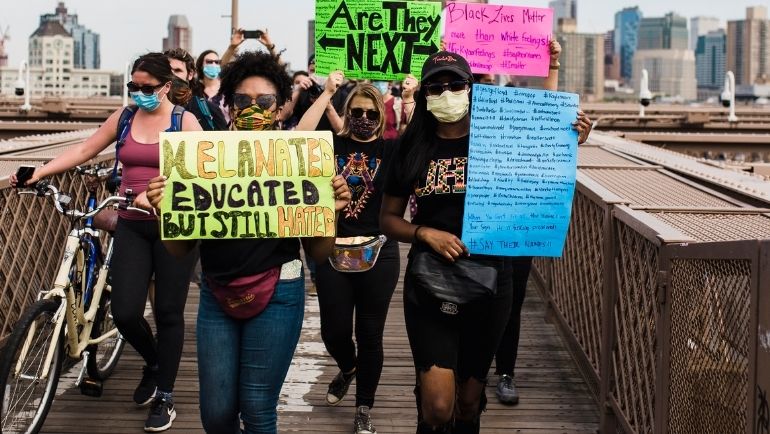New minor in urban education and equity studies prepares students to become change agents

Socrates said, “The secret of change is to focus all of your energy, not on fighting the old, but on building the new.”
This fall, the Wayne State University College of Education introduced a new minor in urban education and equity studies. Grounded in an equity and social justice ideology, it is designed to encourage students to envision and create new constructs needed to build a better, stronger educational system and communities.
“As Michigan’s public research university, Wayne State is well-positioned to prepare the next generation of leaders, educators and professionals to address the interests and needs of our diverse urban communities,” said Roland Sintos Coloma, Ph.D., professor of teacher education. “We have world-class faculty renowned for their research and background in equity and social justice working with undergraduate students to make a difference locally, nationally and globally.”
Undergraduate students with a major in any discipline with a minimum 2.0 GPA are eligible to apply. The minor provides an excellent opportunity for students to develop the knowledge, skills and abilities needed to become change agents in education, social service and community organizations, urban planning, public policy, or program development. It also gives students who want to prepare for graduate and professional studies centered in urban ecologies a solid foundation.
“Courses will prepare them to become advocates for traditionally vulnerable and disproportionately affected populations in urban education, including LGBTQ+ youth, students from lower socioeconomic backgrounds and young women and girls,” said Truman Hudson, Jr., Ed.D., a lecturer and outreach specialist in the Division of Teacher Education. Graduates will be well-positioned for careers and graduate studies focused on issues affecting underrepresented and marginalized populations.”
Students must take a total of 18 credit hours, which includes three core courses — or eight credits — in the college. In Multicultural Education in Urban America, students will explore the educational system in the United States and opportunities to improve education through a multicultural lens. Family, Community and School Partnerships will help students understand how to provide services and support for young people throughout their educational journey, and Becoming an Urban Educator teaches students how to engage and work with learners from various backgrounds.
“Education has been both a place of violence and liberation,” said Aja Reynolds, Ph.D., visiting professor of urban education and critical race studies. “To make the decision to be on the side of justice begins with centering the voices of those historically excluded and committing to create the classrooms in the here and now that we wish for all students.”
A collaboration between the College of Education and College of Liberal Arts and Sciences, the minor requires students to take a minimum of 10 credits of electives. Those courses can be in education or in partner departments from CLAS— including African American Studies, English, Latina/o and Latin American Studies, Gender, Sexuality and Women’s Studies, geography, history, political science, sociology, Spanish, and urban studies and planning — which allows students to concentrate in a specific area.
“We are excited to partner with the College of Liberal Arts and Sciences on this new minor,” said College of Education Dean Anita G. Welch. “It supports our efforts to be a leader in teaching, learning, and research focused on urban education and underscores our commitment to equity, inclusion and social justice. Students who minor in urban education and equity studies will increase their awareness of factors shaping the educational landscape and focus on application, advocacy and action in support of students, teachers, families and communities that need better systems, services and support.”
"CLAS is proud of the new collaborative minor in urban education and equity studies," said College of Liberal Arts and Sciences Dean Stephanie Hartwell. "It is critical that future educators and leaders understand the political, cultural and socioeconomic issues that affect schools in urban areas. CLAS recently added to its social justice course offerings as well. We hope that this new minor is one of many cross-college initiatives that give students the opportunity to be trained on these very relevant and pressing issues."
Hudson said the minor in urban education and equity studies can help students use the momentum generated by recent movements to continue to make progress as advocates and activists.
“For example, we are in a space right now with Black Lives Matter where there is greater awareness across various demographics. Many of the people who are marching or who support this effort could take these courses to help guide them in their discussions around the platforms and agendas they are promoting,” he said. “This minor is perfect for students who have a passion for service, are interested in human and civil rights or possess a community organizing spirit. They will learn how to lift up issues of equity in education and become leaders, community builders and changemakers. Education is the vehicle to get there.”
To learn more about the minor in urban education and equity studies, visit https://education.wayne.edu/urban-education-equity-studies/minor or contact Academic Advisor Kurt Troutman at fz4394@wayne.edu or 313-577-1601.